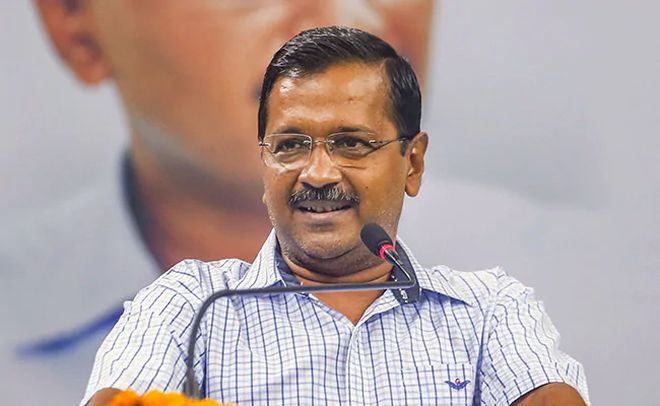
Since Arvind Kejriwal's surprise announcement on Sunday that he would resign as Delhi Chief Minister in two days, Delhi Government ministers and senior Aam Aadmi Party (AAP) leaders have been working overtime to reclaim the moral high ground and sympathy for their leader. In doing so, they seem to be relying on the belief that public memory is short.
In his first public address after being released on bail by the Supreme Court-following over five months in jail-Kejriwal argued that the Apex Court had granted him bail in the alleged cases, even though he was booked under the stringent Prevention of Money Laundering Act (PMLA). He claimed that the Court had given him the best possible relief and, since the trial and final verdict on the alleged excise scam are expected to be prolonged, he decided to step down temporarily. He stated he would not occupy the chief minister's chair until people certify his "honesty" in the upcoming Delhi Assembly election.
Having A 'Nightwatchman'
The Election Commission is scheduled to begin the electoral process in January 2025, but Kejriwal now wants the elections to be held in November. In either case, Kejriwal aims to have what is known in cricketing terms as a "nightwatchman"-someone to keep the position warm for him.
Senior AAP leaders are working to convince the public that Kejriwal is making a significant sacrifice and stands firm on the moral front. Their main arguments are as follows:
- Kejriwal is the first politician to seek a certificate of honesty from the public in an election; voters should elect him if they believe he is honest.
- Kejriwal is the first politician to resign after coming out of jail on bail.
- The "people's court" is the highest court, and they will decide whether he is honest while the legal system evaluates the merits of the charges brought by the ED and CBI.
- Kejriwal did not resign in the past six months, following his arrest on March 21, because resigning would have set a precedent that could embolden the Modi government to imprison opposition chief ministers and break their parties. By not resigning, Kejriwal thwarted the BJP's plans.
Let's examine these claims.
First, when Kejriwal says he will return as chief minister once the people give a mandate to AAP, he conveniently overlooks two crucial conditions imposed by the Supreme Court: 1) he cannot attend the Delhi Chief Minister's office, and 2) he cannot sign off on files. These conditions imply that he cannot hold Cabinet meetings or engage in policy-making or policy reviews. Such conditions suggest that even with new elections, Kejriwal would remain a dysfunctional chief minister.
These conditions differ from disqualification cases like Sonia Gandhi's office of profit case, where a politician is disqualified for a specific issue but may be re-elected later.
Kejriwal knew well that, according to the court order, he could have remained chief minister in title only, without the actual responsibilities of the role.
Poll Victory Isn't An Absolution
Second, the claim that a win in a fresh election would be a certificate of honesty from the people is dubious. For example, former Bihar Chief Minister Lalu Prasad Yadav, Om Prakash Chautala, and Sukh Ram were re-elected despite being convicted in court. Their victories did not necessarily validate their honesty. If re-election were a true indicator of honesty, it would imply that almost no politician in India is corrupt.
Kejriwal should have followed LK Advani's example, who, when charged in the Jain Hawala case, announced he would not seek public office until he cleared his name in court.
Running The Government From Jail
Third, the claim that Kejriwal is the first chief minister to resign after bail may make for good TV debates but is not grounded in historical context. It has been an unwritten norm for a chief minister facing imminent arrest to resign and transfer responsibilities. Examples include Lalu Yadav in Bihar, Uma Bharti in Madhya Pradesh, Jayalalithaa in Tamil Nadu, and more recently, Hemant Soren in Jharkhand. However, Kejriwal, who presents himself as a crusader against corruption, chose not to resign and continued as Chief Minister, exploiting the legal ambiguities.
The Supreme Court did not explicitly ask him to resign, as no such law exists, but their bail order made it clear that his position as chief minister was untenable.
After Kejriwal's arrest and subsequent judicial custody, AAP leaders claimed he could run the Delhi government from jail. Delhi's Cabinet Minister Atishi Marlena even held a press conference with a directive from Kejriwal regarding water and sewage issues. However, this claim was proven false, as Kejriwal could not effectively manage the government from jail.
Fourth, any student of politics would understand that recent Supreme Court rulings on Article 356 and defection have made legal scrutiny rigorous. Additionally, destabilising a government is only feasible with a thin majority and significant internal party divisions. The AAP in Delhi, the Trinamool Congress government in West Bengal, and the DMK government in Tamil Nadu all have substantial majorities, making it nearly impossible for rival political formations to engineer defections and destabilise these governments.
However, Kejriwal thrives on victimhood politics, using it as a strategy to stay in the headlines.
(Sanjay Singh is Contributing Editor, NDTV)
Disclaimer: These are the personal opinions of the author


